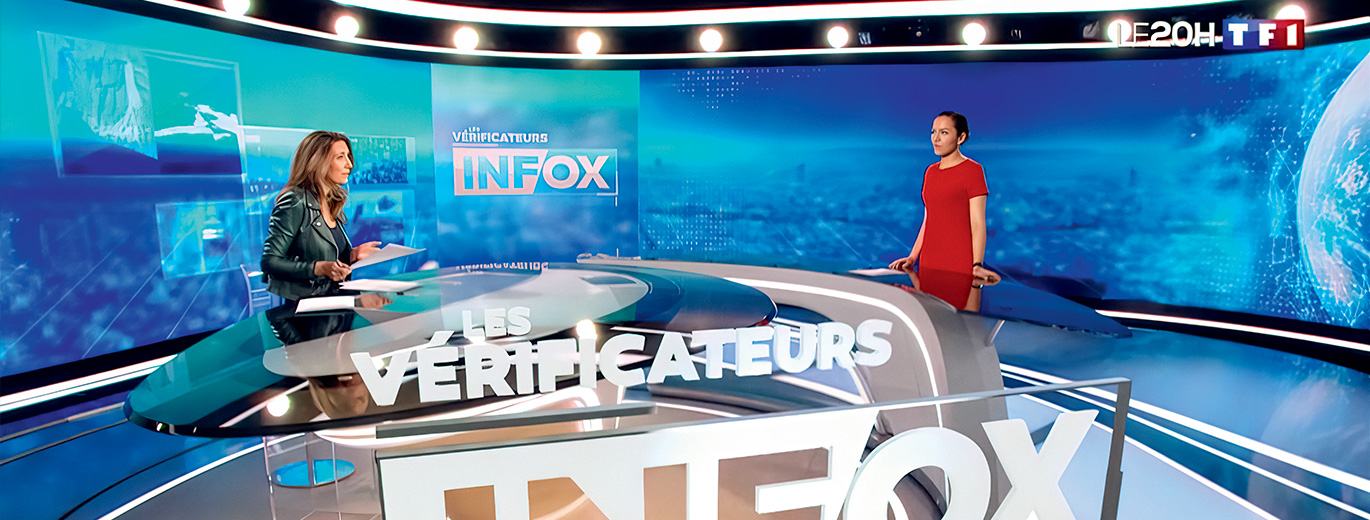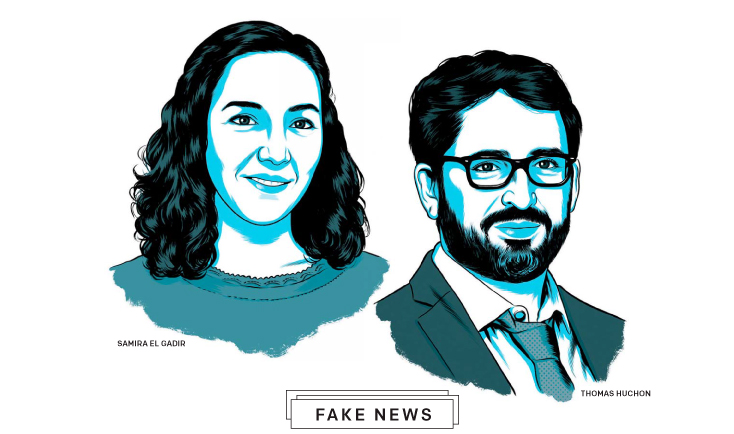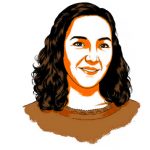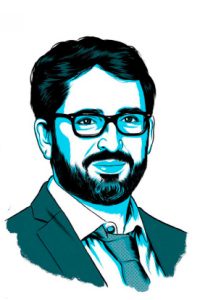
TF1: fight against fake news
News
So, what can be done about conspiracy theories and other types of fake news that spread like wildfire across the Internet and in certain media? With the presidential election only a few months away, Le Minorange asked the journalists Samira El Gadir and Thomas Huchon explain these phenomena.
Interview by Céline de Buttet

QuWhat is fake news and how is it different from the misinformation that we have always known?
Samira El Gadir:
The English term fake news refers to false information. In most cases, fake news is spread intentionally and then shared, in some cases without the people who are sharing it realizing that it is false. Nowadays, social networks endow false news with a power that did not exist a few decades ago. There is no hierarchy when it comes to information. Everyone can say whatever they want. We saw that with Covid-19. The neighbor in my building speaks at the same level as an infectious disease expert.
Thomas Huchon
The French language is not as precise as English. Fake news is not merely false information; it is false information fabricated in such a way as to make it seem true, with the deliberate aim of deceiving. The fabricator’s aim is to manipulate, which is not always true of the person who passes along the falsehood. The newspapers report that Martin Bouygues has died or that Xavier Dupont de Ligonnès has been arrested. The following day, they are obliged to publish a correction. Voltaire said, “Honest people who think are critical, clever people are satirical, wicked people are slanderous.” Slanderous texts were written under a false name. They claimed things such as “Marie-Antoinette eats children for breakfast.” That was fake news in the eighteenth century, circulated secretly. Nowadays, the social networks make many things possible. Our civilization has changed profoundly.

SAMIRA EL GADIR
Journalist and head of TF1 and
LCI’s fact-checking unit, she
joined the TF1 group in 2008.
After ten years as an economics
reporter for TF1 television news,
she learned about the methods
of combatting fake news,
particularly on the Internet and
the social networks. Samira
El Gadir is a graduate of the
journalism school CFJ in Paris.

SAMIRA EL GADIR
Journalist, author, and film
director, Thomas Huchon is
a specialist in the Web, fake
news, and conspiracy theories.
In 2017, he made his first
documentary, Comment Trump
a manipulé l’Amérique (How
Trump Manipulated America).
A journalist at the independent
online platform Spicee, Huchon
is also a lecturer at Sciences
Po Paris. Since March 2021,
he has joined with Bénédicte
Le Chatelier to present
Anticomplot on LCI. This weekly
program explains to viewers
why conspiracy theories are so
compelling and describes ways
of detecting them.
Do fake news and conspiracy theories necessarily go together?
Thomas Huchon :
Fake news does not always involve conspiracy theories. On the other hand, there would be no conspiracy theories without fake news. Conspiracy theories are an ideological narrative, a vision of the world, reasoning built on fake news stories.
Samira El Gadir :
An analogy might be: Fake news is a murder; a conspiracy theory is a premeditated murder.
Thomas Huchon :
With conspiracies, we reach another level. People who believe the conspiracies think you are the one who is misinformed and that you need to be given the true story. There is a psychological process of distrust and brainwashing involved.
I’m 100 percent convinced of that today. We’re talking to everyone, and we’ve got a very powerful voice.
Comment la rédaction de TF1 lutte-t-elle contre les fake news ?
Samira El Gadir :
When I teach courses for middle-school students, I tell them that today we are seeking to eat better by consuming organic foods and local produce. It’s the same with news. We need to be selective in what we ingest and to think more critically. Just as you check where the meat you buy comes from, you can search for the source of a news item. Our audience asks us to help them do this. At TF1 and LCI, 40 journalists have received training in the verification of images, in-depth research on the social networks, and where to find publicly available data.
All of them, in their specific fields – polititics, the environment, and soon – are focused each day on dissecting the stories that will then be stamped “The Fact-Checkers” on TF1, LCI, and the web. When I began setting that unit up, everyone told me: “Fake news? That’s not us. The news we report is true. We don’t give out false information.” Today there are formats that are not only stamped, but there is also accountability. It’s an editorial policy and a hell of a change. At the start, we also asked ourselves: We are watched by seven million people. If we talk about a topic seen by ten thousand people on Twitter, aren’t we giving a platform to this fake news? I’m 100 percent convinced of that today. We’re talking to everyone, and we’ve got a very powerful voice.
Freedom of speech does not work without accountability.
Will fact-checking enable traditional media to regain the public’s trust?
Samira El Gadir :
Journalistic inquiries have always been done, but nowadays, with the mass of information available, tools are used that weren’t used before. Like reverse image search, for example, wich allows you tio find the source of an image. That’s not something I learned in journalism school. I was a reporter for 15 years, but the internet was never my field. The situation has changed, and so has the way we transmit information. Previously, we didn’t reveal the messy internal process; we simply reported the results of our inquiry. Today, we have to explain how we conducted the inquiry and be transparent about the methods we used. That helps to restore trust.
Thomas Huchon :
Early in my career, I detested the term fact-checking. As far as I was concerned, that was not our job. I was wrong. I hadn’t understood the new reality, the distrust harbored by a portion of the population, and the arms we had at our disposal.
Samira El Gadir :
Fact-checking ensures more transparency and honesty. It has happened that I fact-checked something viewed by 7 million people, and had to say that I didn’t have the answer; that given the information we had, and despite a thorough investigation, we couldn’t confirm a particular figure cited by such and such politician.
Thomas Huchon :
Freedom of speech does not work without accountability. The law in France guarantees freedom of speech provided the person speaking is identifiable and accountable for what he says. On Facebook or Twitter, I do not know who is speaking to me. That’s another problem these networks pose for us: they eliminate our ability to interpret things. I do not believe we can live in a world where anyone can publish any information whatever if they are unfamiliar with the basics of journalism. We cannot go along as if there were no work and no method involved. It’s not conspiracy theorists versus rationalists. Roughly speaking, conspiracy theorists make up five percent of the public, rationalists make up five percent, and in between are the ninety percent who have no idea and are lost. These people need to be helped and guided. Fact-checking is also to teachers and educators, who need weapons to combat these phenomena.
Samira El Gadir :
For those who come looking information, we have created a Twitter account and a email address – Lesverificateurs@tf1.fr – so that people can ask us to check something. For those who have legitimate doubts, as was the case during the first wave of the pandemic, we provide explanations. We have received messages from many viewers saying that they were reassured by what we told them.